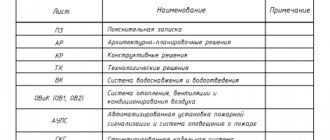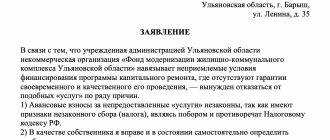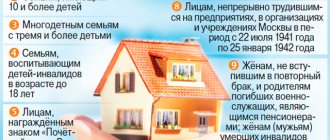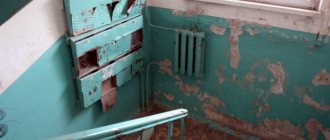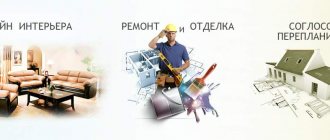In 2013, apartment owners were given another responsibility - carrying out general building overhauls.
They also have the right to choose the option of forming the corresponding Fund and appoint an owner who will be responsible for the accumulation of funds and their disposal. It could be a management company or a homeowners association.
In this article we will tell you what the FKR is, how it is formed and how to make payments.
general description
The fund for capital repairs of apartment buildings is intended for carrying out repair work . The main difference between a major overhaul and a current one is the type and volume of work. In addition, they differ in the source of financing.
The management company or homeowners association is responsible for carrying out routine repairs. It is carried out using funds transferred by the owners. And major repairs are organized by the regional operator using funds from the Federal Financial Markets Fund.
The Capital Repair Fund can be called a kind of “piggy bank” into which funds are collected to carry out complete repairs in an apartment building. A separate fund is created for each house.
In 2021, the FKR includes:
- contributions for major repairs from apartment owners;
- income from the rental of common property (premises);
- interest for delays in making payments for major repairs;
- HOA funds, including profits from its activities;
- bank interest from the account in which the funds from the house are located.
There are different types of this non-profit organization . One should not confuse funds formed for each building for the purpose of accumulating funds, and FKRs created as regional operators to control the funds of individual high-rise buildings.
There are similar Funds in all regions of the country. For example, in Moscow, the creation of such an organization is provided for by Resolution No. 834-PP dated December 29, 2014.
Types of formation of FKR
The capital repair fund can be formed in two ways:
- “common boiler” (or regional operator account);
- individual account.
By default, funds are created on the account of the regional operator . To transfer savings to an individual account, a general decision of the apartment owners in the building is required. To make a decision, the consent of 2/3 of all homeowners is required (clause 1.1, part 2, article 44 of the Housing Code of the Russian Federation).
The decision to transfer savings to a special account must be made no later than six months after the publication of the regional program, which includes this high-rise building. In some cases, this period may be reduced by decision of the local authorities.
Such programs are organized for the period required to carry out major repairs of common property in all residential multi-storey buildings on the territory of a constituent entity of the Russian Federation.
After making a decision to transfer the savings to a special account, it is necessary to send a copy of the owners’ agreement from the general building meeting to the regional operator.
During this council of residents the following issues should be resolved:
- amount of payments for major repairs;
- type and scope of work;
- repair period;
- who will become the owner of the special account;
- in which credit institution the account will be opened.
If the decision to create a special account was not made within 6 months, then the capital repair fund for this house will be formed on the account of the reoperator.
In this case, no notifications are sent to residents . They will only learn about joining from payment receipts that will be sent later.
Overhaul funds as legal entities
The program for reforming the housing stock in the Russian Federation provides for the functioning of a system of regional operators that are registered as legal entities. According to its organizational and legal form, the regional operator is a non-profit organization, and has the right to engage in entrepreneurial activities only to achieve its main core goals.
In addition to the powers to control the correctness and timeliness of collecting payments from citizens, the Capital Repair Funds form regional lists of multi-apartment buildings to be repaired in order of priority. These lists are approved at the level of constituent entities of the Russian Federation and are the basis for holding a competition for the selection of contractors.
All capital repair funds managed by the regional operator not only have a strictly designated purpose, but are also protected by the state from seizure or forced seizure. The only case where problems may arise with spending funds from a special account is the bankruptcy of a banking institution, however, even in such circumstances, the state guarantees the inviolability of the finances of the overhaul fund.
Who does the Foundation report to?
The regional operator for the overhaul of multi-apartment residential buildings is formed by the constituent entities of the Russian Federation . But according to the law, it is possible to create several regoperators in one subject. The FKR cannot create separate branches or other organizations.
In case of failure to fulfill his obligations or poor performance, he must answer to the owners of the living space. In this case, the Fund is obliged to pay them compensation in the form of an amount equal to what they have already contributed for major repairs.
Responsibility for failure to fulfill obligations falls equally on the regional operator and the subject of the Russian Federation. They are forced to bear subsidiary liability to apartment owners.
The money received by the regional operator from property owners can only be used for major home repairs. The organization cannot spend these funds for personal needs.
Functions of NPOs
The Capital Repair Fund is required to perform the following actions:
- Collection and storage of contributions for major repairs from homeowners.
- Opening a bank account to store accumulated funds and carry out transactions if the owners decide to form a financial fund in a special account.
- Performing customer responsibilities during repair work.
- Financing major repairs from accumulated funds and attracting various budget funds for the same purposes.
- Interaction with local authorities.
According to current legislation, if the fund for the overhaul of a particular house does not have enough funds, then they can be taken from the funds for other buildings, but only with a further return.
Responsibilities of the FKR:
- Send notifications to apartment owners in advance of the scheduled date of repairs with the volume and timing of planned work, their cost and methods of financing.
- Preparation of projects and goals for major repairs.
- Searching for contractors and concluding contracts with them.
- Quality control of work and acceptance of the final result.
Do I need to pay into the capital repair fund?
A significant part of the housing stock of the Russian Federation is in a worn-out condition . To carry out their repairs, monthly cash contributions are collected from the owners of residential premises. But sometimes residents have to independently organize the elimination of problems that have arisen in the house, collecting new amounts for this.
And then the questions arise: why pay to the FKR if, if necessary, you have to do everything yourself? And some owners decide to stop paying for major repairs. Subsequently, they receive letters from NGOs.
Such “chain letters” are sent only in case of non-payment. Your unwillingness to pay does not lead to termination of the contract with the Foundation, so they will regularly send such notifications.
But what to do if the house is in terrible condition, and no one plans to start repairing it? How to respond to constant payments from the Federal Financial Markets Fund when repairs to the building are not completed?
In such situations, many refuse to continue paying for major repairs, but it is necessary to understand that such debts can lead to litigation.
Is it possible not to pay the invoice?
The owner of the premises sometimes thinks that the payment for housing and communal services is exorbitant, and the services are not provided in full. If this is indeed the case, then you should apply to the relevant authorities, but under no circumstances refuse to pay the receipt.
You should be aware that failure to pay the dues for major repairs on time can lead to serious consequences.
Capital repair funds carefully monitor the timely receipt of payments, therefore, in case of late payment for their services in accordance with the legislation of the Russian Federation, the careless payer will first be charged a penalty for each day of delay.
Next, the NPO FKR transfers the statement of non-payment to the court, which, as soon as possible, issues a decision to collect funds from the debtor. The collection order is transferred to the bailiffs, who immediately seize bank accounts and without authorization write off the required funds from the debtor's account.
To prevent such a situation, you should carefully pay the fees for major repairs indicated on the receipt as FKR. If for some reason there is no receipt, you can pay the amount using the details specified in the receipt for previous periods, or contact your regional fund for information.
Read more >>
I received a claim from the Capital Repair Fund: what should I do?
Letters demanding payment for major repairs await all non-payers. But what to do if the reoperator does not fulfill its obligations, and the amount of debt is growing?
First of all, you should make sure that the notifications sent are legal. They must include the following information:
- name and address of the FKR;
- contact details of the organization;
- fund details (TIN, legal address, checkpoint);
- Full name of the payer (i.e. yours);
- number of your agreement with the FKR;
- the amount of debt and a detailed breakdown of the debt by month;
- amount of penalties and fines;
- payment details;
- consequences of non-payment of debt;
- links to current bills;
- FKR seal;
- Full name and signature of the responsible person.
Without this information, the letter is considered illegal. Only notifications that meet the above requirements are valid.
How to find out the debt to the Capital Repair Fund
The next step is to check that the amount of debt is correct. There are several ways to find out the exact amount of debt:
- When contacting the registrar's branch in person. To do this, you need to contact the address indicated on the payment. It is recommended to take your passport and certificate of ownership of the apartment with you.
- Through your personal account on the website of the regional operator. You must first register. Registration allows you to view all payments made and the amount of debt incurred.
- On the registrar’s website, through the “Payment of fees” button. When you click on this button, a window appears in which you must enter the ID number. After this, the payer's address and the amount of debt will be displayed.
If you decide not to pay your debt to the FCR, you should be prepared for adverse consequences:
- legal action and forced collection of debt;
- seizure of real estate or eviction;
- imposition of encumbrances on the apartment that prevent the disposal of property (sale, donation, etc.);
- fines.
How to competently respond to a claim from the Capital Repair Fund
Letters from the FKR demanding to pay a debt are considered unlawful if the organization does not fulfill its obligations, i.e. does not carry out home renovations. Poorly performed work or its complete absence gives rise to a counterclaim to be sent to the Fund demanding a report on the work done.
If you are determined not to pay any more for major repairs, then you should terminate the contract with the fund. At the same time, we should not forget that the debt already formed will not go away.
If you refuse FKR services, you are not obligated to continue paying for services you do not need, but you will still have to pay off the existing debt.
The counterclaim is sent directly to your Capital Improvement Fund. It must indicate:
- Full name of the head of the organization.
- Description of the illegality of letters sent demanding payment of debt and justification of its reasons.
- Your requirements (providing a legal claim, canceling the debt due to the Fund’s failure to fulfill its obligations, a report on the work done, etc.).
- List of attached documents.
- Signature and date of the complaint.
The counterclaim can be submitted in person to the FKR office or sent by registered mail.


